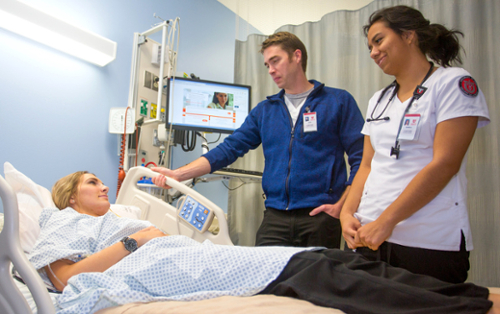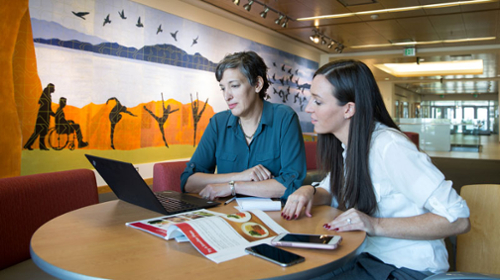Voices of U of U Health
College of Nursing: 2020 Year in Review
It goes without saying that 2020 has been a challenging year. The continuing pandemic, confronting anti-black systemic racism, and a contentious season of election politics grabbed the attention of the world and our nation. These stressors were compounded locally by a significant earthquake in March, a hurricane-force windstorm that swept the state in September, and wildfires that threatened our campus in October. But in the worst of times, we often see the best of people. That has certainly been the case at University of Utah Health.
When yet another new challenge presented itself, faculty, staff, and students all emerged heroic. So it is no surprise then that despite the difficulties of 2020, our University of Utah people and teams accomplished so much. Each of our health science deans has compiled a “2020 Year in Review” reflecting ongoing efforts at improving patient care, enhancing student education, advancing research, and serving our local communities. They say hindsight is 2020, and in hindsight, we have accomplished a great deal in this most unusual year. I know you will enjoy reading these 2020 Year In Reviews.
Michael Good, MD
Designated by the World Health Organization as the International Year of the Nurse and the Midwife, 2020 was a year unlike any other. Still, University of Utah College of Nursing (CON) faculty, staff, and students exhibited incredible resolve, adaptability, and innovation, which contributed to tremendous achievements.
Education
- From April-September 2020, the Bachelor of Science in Nursing (BSN) program had a first-time National Council Licensure Examination pass rate of 94 percent, surpassing state and national averages.
- The College reactivated the primary care pediatric nurse practitioner track within the Doctor of Nursing Practice (DNP) program and launched two new programs of study:
-
-
- Dual PhD-DNP program
- Post-graduate Psychiatric Mental Health Nurse Practitioner certificate
-
-

Nurse Education, Practice, Quality, and Retention faculty developed 13 online education modules about primary care nursing roles, incorporated them into the BSN curriculum, and shared with other programs. More than 2,400 students nationwide have completed the modules.
-
Gwen Latendresse, PhD, CNM, FACNM, continued Health Resources and Services Administration-funded work to increase the number of primary care advanced-practice nurses working in rural settings.
Research
- Faculty and staff held a total grant award portfolio of $35 million with a national ranking of No. 27 among colleges of nursing funded by the National Institutes of Health.
- Kathi Mooney, PhD, RN, FAAN, received a Hillman Innovations In Care grant to expand the Huntsman Cancer Institute’s Huntsman at Home program into three rural counties in eastern Utah. Huntsman at Home provides intensive, hospital-quality clinical care that allows rural patients to be discharged from the hospital sooner and receive follow-up care at home.
- Kathy Sward, PhD, RN, is leading efforts to standardize data elements for pain management and opioid trials, supporting NIH’s The Helping to End Addiction Long-termSM (HEAL) Initiative, an aggressive, trans-agency effort to speed scientific solutions to stem the national opioid public health crisis.
- Andrea Wallace, PhD, RN, FAAN, led research assessing social resources for emergency department patients and those tested for COVID. Approximately 2,500 patients have been referred for community service outreach. She also enrolled 1,200 patients in a study regarding communication during hospital discharge about social resources, integrating nurse perceptions of discharge readiness, which are known to predict readmission.
- The Family Caregiving Initiative, led by Lee Ellington, PhD, is coordinating interdisciplinary work to advance person- and family-centered care where patients and caregivers define their “family” and determine how they will participate in care and decision-making.
Faculty Practice (Clinical)
-
Midwives of BirthCare HealthCare (BCHC), the College’s midwifery and women’s health practice, began offering water birth for healthy, low-risk pregnancies.
-
BCHC shifted to a telehealth model of outpatient prenatal and gynecologic health care, implementing pod scheduling to ensure that healthy midwives were always available to provide seamless patient care. Midwives delivered more than 650 babies, a nearly 13 percent increase from 2019.
-
The College’s Psychiatric Mental Health practices converted to tele-mental health services during the COVID-19 pandemic. Many patients now prefer the ease of virtual visits. NPs have found that youth better engage and share more information during virtual visits as compared with in-person visits.
-
The Utah Legislature awarded nearly $500,000 to the CON Faculty Practice to create a tele-mental consultation service for underserved and rural areas of Utah, provide counseling and mediation management behavioral health services, and enable students to address social determinants of health when providing patient care.
COVID-19
Thanks to the flexibility and resiliency of faculty, staff, and students, the CON continued its important work in all mission areas during the COVID-19 pandemic.
- While the Annette Poulson Cumming Building was closed for several months, faculty quickly converted traditional classroom courses to online courses. Technology staff, the Simulation Center, and the CON instructional designer provided superb support.
- Teresa Garrett, DNP, RN, PHNA-BC, served as a health advisor in the U’s Contact Tracing Unit, developing policy, making classroom notifications, and advising faculty about the need to quarantine students, change classroom setup, reduce exposure risk, and manage expectations. Overall, the team managed more than 5,700 COVID-19 cases and exposures.

- Michelle Litchman PhD, FNP-BC, led a study combining a glucose sensor with an online community. Participants—Spanish-speaking adults with Type 2 diabetes—could see how their glucose responded to personal experiments and unforeseen stressors, such as COVID-19 and the earthquake, and engage in peer support.
- With leaders at Utah’s Juvenile Justice Service (JJS) facilities, CON faculty practice implemented a COVID-19 screening and response plan for incarcerated youth. Nurses and nurse practitioners implemented quarantine and isolation protocols in three facilities with COVID-19 outbreaks. The National Commission of Correctional Health Care praised the College’s response to the COVID-19 pandemic.
- Kathy Sward, PhD, RN, is collaborating with biomedical informatics colleagues and graduate students to develop computational models to understand the spread of COVID-19 infections. The models account for environmental and social factors, as well as the movements of people.
- Using CARES Act funding, Katherine Supiano, PHD, LCSW, FT, and team developed and evaluated a comprehensive model of clinician-facilitated group support to address COVID-19 bereavement and help those recovering from COVID-19 who require additional psychological/emotional support during and following illness.
- Catherine Staes, PhD, MPH, RN, FACMI, championed electronic case reporting (eCR) for COVID infections. She led an interdisciplinary team to implement eCR at U of U Health and integrate the reports automatically and rapidly into Utah’s surveillance system.
Awards
College of Nursing faculty received prestigious national awards during 2020:
- Teresa Garrett, DNP, RN, PHNA-BC, The American Public Health Association Lillian Wald Service Award
- Gwen Latendresse, PhD, CNM, FACNM, FAAN, Fellow in the American Academy of Nursing
- Barbara Wilson, PhD, RN, FAAN, Fellow in the American Academy of Nursing
Looking Ahead
In 2021 and beyond, we will update our strategic plan, operationalize our anti-racism statement, develop academic partnerships, complete accreditation of baccalaureate and master of science programs, and build upon on our national prominence in education, research, clinical care, and community engagement.
